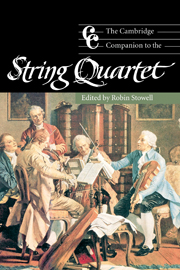Book contents
- Frontmatter
- Part I Social changes and organological developments
- Part II Celebrated ensembles
- Part III Playing string quartets
- Part IV The string quartet repertory
- 8 The origins of the quartet
- 9 Haydn, Mozart and their contemporaries
- 10 Beethoven and the Viennese legacy
- 11 The Austro-Germanic quartet tradition in the nineteenth century
- 12 Traditional and progressive nineteenth-century trends: France, Italy, Great Britain and America
- 13 Nineteenth-century national traditions and the string quartet
- 14 The string quartet in the twentieth century
- 15 The string quartet as a foundation for larger ensembles
- Notes
- Select bibliography
- Index
13 - Nineteenth-century national traditions and the string quartet
from Part IV - The string quartet repertory
Published online by Cambridge University Press: 28 September 2011
- Frontmatter
- Part I Social changes and organological developments
- Part II Celebrated ensembles
- Part III Playing string quartets
- Part IV The string quartet repertory
- 8 The origins of the quartet
- 9 Haydn, Mozart and their contemporaries
- 10 Beethoven and the Viennese legacy
- 11 The Austro-Germanic quartet tradition in the nineteenth century
- 12 Traditional and progressive nineteenth-century trends: France, Italy, Great Britain and America
- 13 Nineteenth-century national traditions and the string quartet
- 14 The string quartet in the twentieth century
- 15 The string quartet as a foundation for larger ensembles
- Notes
- Select bibliography
- Index
Summary
In the developing national musical traditions of the nineteenth century, certain genres, inevitably, were privileged. Given its explicit, decorative, often political nature, opera became the major mode of projecting nation and national character, followed at some distance by the symphonic poem and programme symphony. In such an environment the string quartet, which of all the major genres of the eighteenth century that continued to flourish in the nineteenth tended to retain its abstract credentials, was hardly a priority as a means of expression for the more nationally inclined composer. The landmarks of nationalism, such as Musorgsky's Boris Godunov, Moniuszko's Halka and Smetana's The Bartered Bride and My Country represented the public face of the composer both serving and dramatising the nation, courting and exploiting the aspirations of contemporary fashion in their nations' passage towards the construction of an identity.
For the reflective composer working within national traditions, the string quartet offered the chance to explore a hard-won compositional technique, but also, notably in the case of Smetana, to project a more personal mode of expression once the requirements of the nation had been served. Thus, paradoxically, given its abstract origins, the quartet, reimaged by nineteenth-century aspirations, not only could embody the rigour of orthodoxy, but for the programmatically orientated Smetana proved also to be the means of explicitly dramatising his life; and in the hands of the Russians Tchaikovsky and Arensky the quartet could in the manner of Renaissance and Baroque tombeaux commemorate a life.
- Type
- Chapter
- Information
- The Cambridge Companion to the String Quartet , pp. 266 - 287Publisher: Cambridge University PressPrint publication year: 2003

